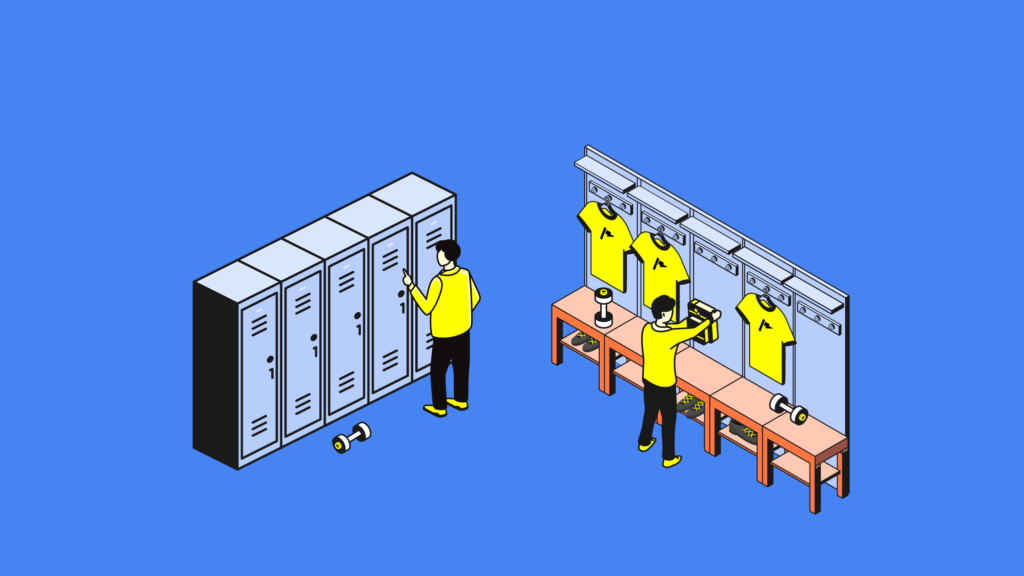Have you ever wondered what it takes to lead a team effectively, regardless of the industry? Whether it’s on the battlefield, in a factory, or even on a sports field, the skill of managing people remains essential. You would hear some eye-opening stories from a variety of industries that could inspire you to be a better manager in your day-to-day work.
I’ve always been fond of the term “losing the locker room”, a term that is almost exclusively used in sports but, in my opinion, can teach us valuable lessons. In the context of sports, when people start to say “this coach has lost the locker room”,
it refers to a situation where the team’s coach or manager has lost the support, respect, and trust of the players in the dressing room. This often happens when there is a breakdown in communication, a lack of alignment between the coach’s strategies and the players’ beliefs,
or when the team’s performance and results have been consistently poor and happiness becomes hard to find on the faces of the team.
One of the training sessions led by Carlo Ancelotti at Bayern Munich in 2016 — Source
This even happens at the best of their game
Carlo Ancelotti, one of the most decorated coaches the sport of football has ever seen, was dismissed from his position as head coach of the coaching staff at the German football club Bayern Munich in 2017. When we looked at the numbers he had during his time there, it seemed like a strange decision,
because having a win percentage of 75% from around 60 matches is a solid number! So what had happened back then that made the club management decided to let him go? The answer was simple and straightforward: he had lost the dressing room!
After a heavy 3–0 defeat against the French giants PSG, it looked like things were not going well for the team or for the 4-time UEFA Champions League winner as a head coach. The post-loss events showed severe friction between the coach and the key players of his team,
who had concerns about his tactical methods and decision-making approaches. Players have simply stopped showing support for their manager. Losing confidence and trust in the coach was the main reason that drove the club to announce that Carlo Ancelotti had been relieved of his duties as the head coach.
How does a manager lose his team’s locker room?
At its core, management is built upon multiple essential pillars, including effective communication, organization, decision-making, delivering results, leading and inspiring team members, holding oneself accountable and responsible, and many other traits. No one would be able to excel in all these pillars,
but maintaining a reasonable level of awareness and focus on them all is a must, and overlooking any of them could have risky consequences as well. This relates to the question of the day: Have you ever asked yourself why even good managers sometimes lose their team’s support? I have! So let’s look at some of the most common mistakes they make that lead to this.
Broken Promises and Absence of Transparency
Do you remember that word that your manager gave to your teammate, that he’d get the long-awaited vacation to spend with family once we delivered that important milestone that we had committed to with the customer?
Unfortunately, change requests kept coming, and for a whole three months until now, this promise hasn’t been fulfilled, and everyone can see how the morale and performance of that teammate have been declining day after day. Not only that, but everyone in the team now starts to take your manager’s words with a pinch of salt because, most probably, he won’t keep them.
Also, sometimes, for managers to avoid making any promises, they show little or no transparency with the team in regards to their plans, expectations, and what should be done and what shouldn’t, and this can lead to misunderstandings, mistrust,
and a sense of exclusion among team members. It prevents productive collaboration and keeps the manager as the sole owner of the decision-making process, meaning that everyone else is only required to comply with his or her orders.
Lack of Support and recognition
There are various ways to provide support to the team, including acknowledging and commending their successful efforts, offering both positive and negative feedback that can be transformed into actionable steps, and granting empowerment while guiding them,
particularly during conflicts and interactions with external parties. Taking joint responsibility in the event of unfavorable outcomes, rather than leaving them to face the consequences of a wrong decision, is crucial. Managers who do not have these as core responsibilities and a high priority will often miss many opportunities to get full support from their teams and unleash their potential.
Also, lack of recognition, keeping people in the dark, and taking the team credit are some of the main reasons to question the manager’s credibility and integrity, giving the team all the reasons to stop supporting their leadership.
Unrealistic asks and changes that drain everyone
We’ve all had a manager who wants everything done all at once and perfectly like everything has a high-priority label on it. Aside from the usual requests to get things done, it’s not easy for teams to adjust to new plans or different ways of doing things,
especially when they’ve been doing them the same way for a long time. Some managers initiate significant changes without thinking about how much the team can handle,
how they feel, or whether they have the right skills. They do this to make their bosses happy or to show they’re doing a good job. Even if these changes work or don’t work, the team doesn’t feel like they’re part of it and won’t be very motivated to make things work better.
Failure to address and tackle problems
There is a reason why people choose to become managers. They ought to be good listeners who allow everyone the opportunity to speak their minds and discuss their issues, worries, and concerns. However, just listening well was not enough because managers are there with the power to take action and improve their people’s lives.
The team will begin to wonder if their manager is truly taking their notes seriously and even working on solving them, making them feel ignored and undervalued in the team. Let alone that some managers have a tendency to downplay their team’s problems and question their worth.
A lack of empathy could also give the team the impression that their feelings are invalid. Failure to follow up on issues and deflect them due to outside factors is an act of a weak management style that doesn’t help its holder take his team forward. It’s important for any manager to avoid being a passive communicator in situations that require assertion or active communication because passiveness and avoidance quickly erode a manager’s credibility.
Favoritism
Favoritism involves treating certain individuals or groups more favorably than others. This can happen based on various factors such as personal relationships, gender, performance, shared beliefs, or social relevance. Within teams, favoritism becomes apparent when a manager provides special treatment to a specific team member,
perhaps due to recent accomplishments, resulting in a lower standard of accountability for their mistakes compared to others. This unequal treatment creates a lot of tension within the team and makes people feel angry and uncertain,
which disrupts team unity and cohesion while also raising doubts about the manager’s overall fairness, particularly in performance evaluations and compensation decisions.
What are the consequences of losing the locker room?
When a manager loses the trust and confidence of their team members, it doesn’t necessarily indicate immediate underperformance or the manager being fired for that particular reason. However, it can lead to major problems such as a toxic culture, demotivated team members, missed opportunities, and a slower pace.
One consequence of losing the locker room is having a team that mostly consists of followers, not leaders. Team members who once took initiative may become shy and less willing to openly share their thoughts and ideas or take responsibility. This can hinder the team’s momentum and pace,
leading to decreased efficiency and effectiveness in achieving goals. Additionally, a team that has lost trust in its manager often requires higher maintenance efforts. Managers may need to invest more time and energy into addressing conflicts, managing unhappy or frustrated team members, and even micromanaging the whole team!
This lack of trust can also contribute to high turnover rates, as team members who feel unsupported or undervalued are more likely to seek opportunities elsewhere. This turnover disrupts team stability and growth. Resistance to change becomes a frequent matter because the team knows what would happen if things went south.
Lastly, when unfortunate events occur, a team that has lost trust in its manager is less likely to support and exert extra time and effort to help the manager get things back on track.
Final Thoughts
No matter how great a manager you are or how amazing your skills are, you will go nowhere without a team that trusts and supports you through thick and thin. I’ve seen many amazing managers fall into that trap of losing their teams’ locker rooms because of a series of wrong decisions or bad assessments of the situation. Having happy stakeholders is great;
committing to deadlines and delivering high-quality results is amazing; but nothing would beat a high-performing, motivated, and happy team on any given day.
This article was written by Muhammad Hani, Thndr’s Head of Engineering, who is passionate about building products that matter.




